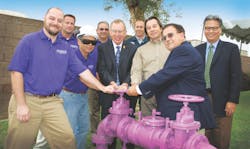About the author: Priscilla Segura is public affairs specialist for Central Basin Municipal Water District. Segura can be reached at [email protected] or 323.201.5504.
Recycling is considered a cultural norm these days. As Recycle Rex, “spokesdinosaur” for CalRecycle (the California Department of Resources Recycling and Recovery), says, “Recycle, reduce, reuse and close the loop.” The blue-colored, small-eyed prehistoric creature helped California promote and encourage recycling, and it worked.
But recycling messages have been selective and exclusive, often leaving out one form of recycling—water. Although the term is gaining popularity in this industry, it still raises a brow and a “yuck factor” from many people. Some of the biggest obstacles for recycled water have been a lack of public knowledge and acceptance. The unknown typically is met with skepticism; however, in light of a growing population, recycled water is more than just an experiment—it is a solution to a drought-ridden region’s reliance on imported water.
Conversations on Conservation
There are several strategies that can be implemented to conserve water; however, using recycled water can conserve drinking water by the millions rather than thousands. Central Basin Municipal Water District, a water wholesaler in Southeast Los Angeles, promotes and connects sites to its recycled water system. The district recently partnered with Air Products, an industrial gas company that manufactures liquid nitrogen, oxygen and argon, to bring in recycled water. The company, located in the city of Santa Fe Springs, Calif., consumed more than 70 million gal of drinking water for its cooling towers per year—enough water to supply to more than 400 families for one year. That statistic was significant enough to present an opportunity for Central Basin to approach Air Products with an idea that would benefit the company and region.
Conversations surrounding the Air Products recycled water connection actually began in the 1990s; however, due to a lack of funding, the project was put off. Twenty years later, the project is complete and Central Basin is delivering more than 70 million gal per year of recycled water via Air Products.
During construction planning, several concerns arose. Central Basin’s goal was to find the shortest economical construction route that would not disturb residents. It was determined that construction should take place on Burke Street and Dice Road, two nearby streets.
The connection to the Air Products facility was made from Central Basin’s Rio Hondo Pump Station. Central Basin’s recycled water system is broken up into two distribution systems: the Century Project and the Rio Hondo Project. The design plans included an extension from the Rio Hondo Project pipeline through Burke Street and into the Air Products facility. In terms of costs, Central Basin was responsible for the construction on the public right of way and Air Products was responsible for the onsite construction.
The Road to Recycled Water
Once the construction route was determined, Central Basin, in conjunction with Air Products and the construction consultant, needed to ensure that all local governing requirements were met.
The California State Health Department required that all utility lines be kept separate, meaning the drinking water line needed to be several feet away from the recycled water pipe and the sewer line needed to be kept below the recycled water line. The state health department had to approve all plans in the public right of way, such as streets and sidewalks. In addition, the design had to be approved by the Los Angeles County Department of Public Health, which would review the Air Products onsite construction portion.
Once those requirements were met, Central Basin also had to address concerns made by Air Products. Because Air Products uses water and pressure to cool its towers, it was important that it maintained a water system to prevent its towers from overheating. In order to prevent any overheating accidents, Central Basin left the existing drinking water pipe as a backup; therefore, if there was a connection failure, Air Products still would have access to the drinking water pipeline.
After the construction and permits were received, Central Basin and Air Products were ready to turn on the valves. To celebrate the recycled water connection, Central Basin and Air Products hosted a valve turning event that was attended by the Central Basin Board vice president, Robert Apodaca; city of Santa Fe Springs mayor, Richard Moore; Air Products staff; and Department of Public Health officials.
Air Products joined almost 300 sites that are connected to the Central Basin recycled water system. With California Gov. Jerry Brown’s emergency drought declaration, connecting to recycled water is more important than ever. Recycled water is less expensive than imported water and it is in line with environmental goals. With those benefits, it is hard to say no.
Download: Here
